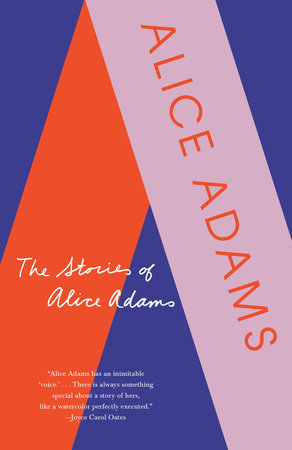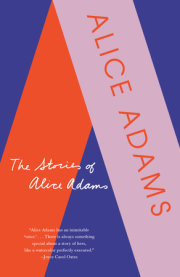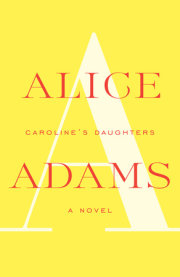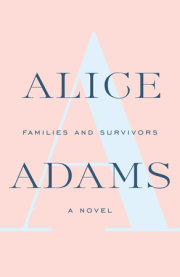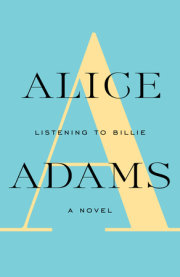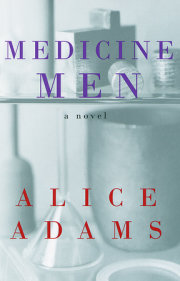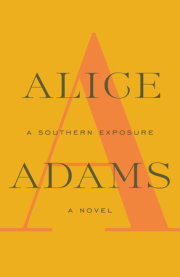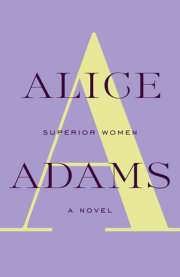VERLIE I SAY UNTO YOU
Every morning of all the years of the thirties, at around seven, Verlie Jones begins her long and laborious walk to the Todds' house, two miles uphill. She works for the Todds--their maid. Her own house, where she lives with her four children, is a slatted floorless cabin, in a grove of enormous sheltering oaks. It is just down a gravelly road from the bending highway, and that steep small road is the first thing she has to climb, starting out early in the morning. Arrived at the highway she stops and sighs, and looks around and then starts out. Walking steadily but not in any hurry, beside the winding white concrete.
First there are fields of broomstraw on either side of the road, stretching back to the woods, thick, clustered dark pines and cedars, trees whose lower limbs are cluttered with underbrush. Then the land gradually rises until on one side there is a steep red clay bank, going up to the woods; on the other side a wide cornfield, rich furrows dotted over in spring with tiny wild flowers, all colors--in the winter dry and rutted, sometimes frosted over, frost as shiny as splintered glass.
Then the creek. Before she comes to the small concrete bridge, she can see the heavier growth at the edge of the fields, green, edging the water. On the creek's steep banks, below the bridge, are huge peeling poplars, ghostly, old. She stands there looking down at the water (the bridge is halfway to the Todds'). The water is thick and swollen, rushing, full of twigs and leaf trash and swirling logs in the spring. Trickling and almost dried out when summer is over, in the early fall.
Past the bridge is the filling station, where they sell loaves of bread and cookies and soap, along with the gas and things for cars. Always there are men sitting around at the station, white men in overalls, dusty and dried out. Sometimes they nod to Verlie. "Morning, Verlie. Going to be any hot day?"
Occasionally, maybe a couple of times a year, a chain gang will be along there, working on the road. The colored men chained together, in their dirty, wide-striped uniforms, working with their picks. And the thin, mean guard (a white man) with his rifle, watching them. Looking quickly, briefly at Verlie as she passes. She looks everywhere but there, as her heart falls down to her stomach and turns upside down. All kinds of fears grab at her, all together: she is afraid of the guard and of those men (their heavy eyes) and also a chain gang is one of the places where her deserting husband, Horace, might well be, and she never wants to see Horace again. Not anywhere.
After the filling station some houses start. Small box houses, sitting up high on brick stilts. On the other side of the highway red clay roads lead back into the hills, to the woods. To the fields of country with no roads at all, where sometimes Mr. Todd goes to hunt rabbits, and where at other times, in summer, the children, Avery and Devlin Todd, take lunches and stay all day.
From a certain bend in the highway Verlie can see the Todds' house, but she rarely bothers to look anymore. She sighs and shifts her weight before starting up the steep, white, graveled road, and then the road to the right that swings around to the back of the house, to the back door that leads into the kitchen.
There on the back porch she has her own small bathroom that Mr. Todd put in for her. There is a mirror and some nails to hang her things on, and a flush toilet, ordered from Montgomery Ward, that still works. No washbasin, but she can wash her hands in the kitchen sink.
She hangs up her cardigan sweater in her bathroom and takes an apron off a nail. She goes into the kitchen to start everyone's breakfast.
They all eat separate. First Avery, who likes oatmeal and then soft-boiled eggs; then Mr. Todd (oatmeal and scrambled eggs and bacon and coffee); Devlin (toast and peanut butter and jam); and Mrs. Todd (tea and toast).
Verlie sighs, and puts the water on.
Verlie has always been with the Todds; that is how they put it to their friends. "Verlie has always been with us." Of course, that is not true. Actually she came to them about ten years before, when Avery was a baby. What they meant was that they did not know much about her life before them, and also (a more important meaning) they cannot imagine their life without her. They say, "We couldn't get along without Verlie," but it is unlikely that any of them (except possibly Jessica, with her mournful, exacerbated and extreme intelligence) realizes the full truth of the remark. And, laughingly, one of them will add, "No one else could put up with us." Another truth, or perhaps only a partial truth: in those days, there and then, most maids put up with a lot, and possibly Verlie suffers no more than most.
She does get more money than most maids, thirteen dollars a week (most get along on ten or eleven). And she gets to go home before dinner, around six (she first leaves the meal all fixed for them), since they--since Mr. Todd likes to have a lot of drinks and then eat late.
Every third Sunday she gets off to go to church.
None of them is stupid enough to say that she is like a member of the family.
Tom Todd, that handsome, guiltily faithless husband, troubled professor (the 10 percent salary cuts of the Depression; his history of abandoned projects--the book on Shelley, the innumerable articles)--Tom was the one who asked Verlie about her name.
"You know, it's like in the Bible. Verlie I say unto you."
Tom felt that he successfully concealed his amusement at that, and later it makes a marvelous story, especially in academic circles, in those days when funny-maid stories are standard social fare. In fact people (white people) are somewhat competitive as to who has heard or known the most comical colored person, comical meaning outrageously childishly ignorant. Tom's story always goes over well.
In her summer sneakers, shorts and little shirt, Avery comes into the dining room, a small, dark-haired girl carrying a big book. Since she has learned to read (her mother taught her, when she was no bigger than a minute) she reads all the time, curled up in big chairs in the living room or in her own room, in the bed. At the breakfast table.
"Good morning, Verlie."
"Morning. How you?"
"Fine, thank you. Going to be hot today?"
"Well, I reckon so."
Avery drinks her orange juice, and then Verlie takes out the glass and brings in her bowl of hot oatmeal. Avery reads the thick book while she eats. Verlie takes out the oatmeal bowl and brings in the soft-boiled eggs and a glass of milk.
"You drink your milk, now, hear?"
Verlie is about four times the size of Avery and more times than that her age. (But Verlie can't read.)
Verlie is an exceptionally handsome woman, big and tall and strong, with big bright eyes and smooth yellow skin over high cheekbones. A wide curving mouth, and strong white teeth.
Once there was a bad time between Avery and Verlie: Avery was playing with some children down the road, and it got to be suppertime. Jessica sent Verlie down to get Avery, who didn't want to come home. "Blah blah blah blah!" she yelled at Verlie--who, unaccountably, turned and walked away.
The next person Avery saw was furious Jessica, arms akimbo. "How are you, how could you? Verlie, who's loved you all your life? How could you be so cruel, calling her black?"
"I didn't--I said blah. I never said black. Where is she?"
"Gone home. Very hurt."
Jessica remained stiff and unforgiving (she had problems of her own); but the next morning Avery ran down into the kitchen at the first sound of Verlie. "Verlie, I said blah blah--I didn't say black."
And Verlie smiled, and it was all over. For good.
Tom Todd comes into the dining room, carrying the newspaper. "Good morning, Avery. Morning, Verlie. Well, it doesn't look like a day for getting out our umbrellas, does it now?"
That is the way he talks.
"Avery, please put your book away. Who knows, we might have an absolutely fascinating conversation."
She gives him a small sad smile and closes her book. "Pass the cream?"
"With the greatest of pleasure."
"Thanks."
But despite the intense and often painful complications of his character, Tom's relationship with Verlie is perhaps the simplest in that family. Within their rigidly defined roles they are even fond of each other. Verlie thinks he talks funny, but not much more so than most men--white men. He runs around with women (she knows that from his handkerchiefs, the lipstick stains that he couldn't have bothered to hide from her) but not as much as Horace did. He bosses his wife and children but he doesn't hit them. He acts as Verlie expects a man to act, and perhaps a little better.
And from Tom's point of view Verlie behaves like a Negro maid. She is somewhat lazy; she does as little cleaning as she can. She laughs at his jokes. She sometimes sneaks drinks from his liquor closet. He does not, of course, think of Verlie as a woman--a woman in the sense of sexual possibility; in fact he once sincerely (astoundingly) remarked that he could not imagine a sexual impulse toward a colored person.
Devlin comes in next. A small and frightened boy, afraid of Verlie. Once as he stood up in his bath she touched his tiny penis and laughed and said, "This here's going to grow to something nice and big." He was terrified: what would he do with something big, down there?
He mutters good morning to his father and sister and to Verlie.
Then Jessica. Mrs. Todd. "Good morning, everyone. Morning, Verlie. My, doesn't it look like a lovely spring day?"
She sighs, as no one answers.
The end of breakfast. Verlie clears the table, washes up, as those four people separate.
There is a Negro man who also (sometimes) works for the Todds, named Clifton. Yard work: raking leaves in the fall, building a fence around the garbage cans, and then a dog kennel, then a playhouse for the children.
When Verlie saw Clifton the first time he came into the yard (a man who had walked a long way, looking for work), what she thought was: Lord, I never saw no man so beautiful. Her second thought was: He sick.
Clifton is bronze-colored. Reddish. Shining. Not brown like most colored (or yellow, as Verlie is). His eyes are big and brown, but dragged downward with his inside sickness. And his sadness: he is a lonesome man, almost out of luck.
"Whatever do you suppose they talk about?" Tom Todd says to Jessica, who has come into his study to help him with the index of his book, an hour or so after breakfast. They can hear the slow, quiet sounds of Verlie's voice, with Clifton's, from the kitchen.
"Us, maybe?" Jessica makes this light, attempting a joke, but she really wonders if in fact she and Tom are their subject. Her own communication with Verlie is so mystifyingly nonverbal that she sometimes suspects Verlie of secret (and accurate) appraisals, as though Verlie knows her in ways that no one else does, herself included. At other times she thinks that Verlie is just plain stubborn.
From the window come spring breaths of blossom and grasses and leaves. Of spring earth. Aging plump Jessica deeply sighs.
Tom says, "I very much doubt that, my dear. Incredibly fascinating though we be."
In near total despair Jessica says, "Sometimes I think I just don't have the feeling for an index."
The telephone rings. Tom and Jessica look at each other, and then Verlie's face comes to the study door. "It's for you, Mr. Todd. A long distance."
Clifton has had a bad life; it almost seems cursed. The same sickness one spring down in Mississippi carried off his wife and three poor little children, and after that everything got even worse: every job that he got came apart like a bunch of sticks in his hands. Folks all said that they had no money to pay. He even made deliveries for a bootlegger, knocking on back doors at night, but the man got arrested and sent to jail before Clifton got any money.
He likes working for the Todds, and at the few other jobs around town that Mrs. Todd finds for him. But he doesn't feel good. Sometimes he thinks he has some kind of sickness.
He looks anxiously at Verlie as he says this last, as though he, like Jessica, believes that she can see inside him.
"You nervous," Verlie says. "You be all right, come summertime." But she can't look at him as she says this.
They are standing in the small apple orchard where Verlie's clotheslines are. She has been hanging out the sheets. They billow, shuddering in the lively restive air of early spring.
Clifton suddenly takes hold of her face, and turns it around to his. He presses his mouth and his body to hers, standing there. Something deep inside Verlie heats up and makes her almost melt.
"Verlie!"
It is Avery, suddenly coming up on them, so that they cumbersomely step apart.
"Verlie, my father wants you." Avery runs away almost before she has stopped speaking.
Clifton asks, "You reckon we ought to tell her not to tell?"
"No, she's not going to tell."
Verlie is right, but it is a scene that Avery thinks about. Of course, she has seen other grown-ups kissing: her father and Irene McGinnis or someone after a party. But Verlie and Clifton looked different; for one thing they were more absorbed. It took them a long time to hear her voice.
Tom is desperately questioning Jessica. "How in God's name will I tell her?" he asks.
Verlie's husband, Horace, is dead. He died in a Memphis hospital, after a knife fight, having first told a doctor the name of the people and the town where his wife worked.
"I could tell her," Jessica forces herself to say, and for a few minutes they look at each other, with this suggestion lying between them. But they both know, with some dark and intimate Southern knowledge, that Tom will have to be the one to tell her. And alone: it would not even "do" for Jessica to stay on in the room, although neither of them could have explained these certainties.
Copyright © 2002 by Alice Adams. All rights reserved. No part of this excerpt may be reproduced or reprinted without permission in writing from the publisher.

